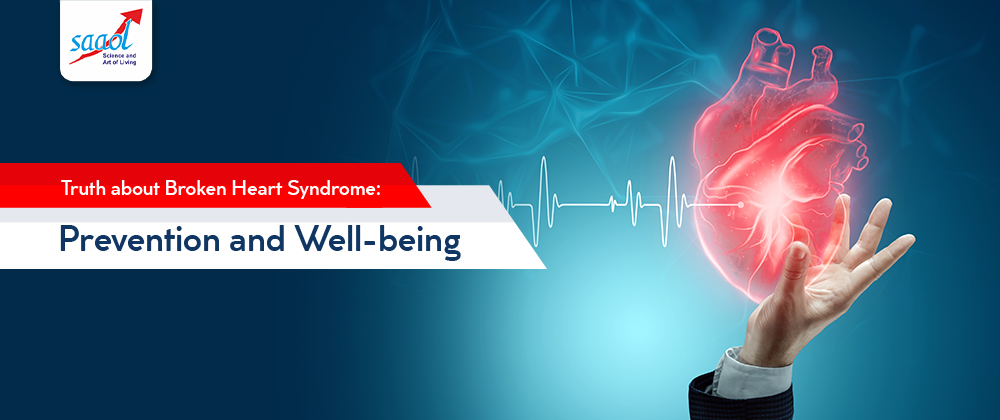Truth about Broken Heart Syndrome: Prevention and Well-being
SAAOL
- July 13, 2023
- 5 Min Read

Introduction
When we talk about heart health, broken heart syndrome, also known as Takotsubo cardiomyopathy or stress-induced cardiomyopathy, is a rather intriguing phenomenon that has captured people around the world. This condition arises from intense emotional or physical stress, temporarily weakening the heart muscle and mimicking the symptoms of a heart attack. Although it does not stem from blocked arteries or heart disease, broken heart syndrome profoundly impacts individuals both physically and emotionally. In this blog, we will try to unravel the causes, broken heart syndrome symptoms, diagnosis, and what is the treatment for broken heart syndrome and its prevention.
Broken Heart Disease: Causes and Triggers
Broken heart syndrome is found to be prominent in the wake of highly stressful situations, ranging from the loss of a loved one and breakups to financial hardships and traumatic events. Remarkably, even moments of joy, like surprise parties or weddings, can ignite this syndrome. These emotional experiences unleash a surge of stress hormones that momentarily disrupt the heart’s normal functioning. This surge is believed to narrow the small blood vessels in the heart, leading to reduced blood flow and the distinct symptoms of broken heart syndrome.
Broken Heart Syndrome Symptoms and Diagnosis
Similar to a heart attack, broken heart syndrome manifests through sudden chest pain or discomfort, shortness of breath, irregular heartbeat, dizziness, and even fainting. An overwhelming sense of impending doom or anxiety may accompany these symptoms. Seeking immediate medical attention when experiencing these signs is crucial, ensuring accurate diagnosis and timely care.
Diagnosing broken heart syndrome necessitates a comprehensive medical evaluation. Healthcare providers employ various tests, including electrocardiograms (ECGs), echocardiograms, blood tests, and coronary angiography, to eliminate other cardiac conditions and confirm the diagnosis.
Broken Heart Syndrome Treatment Strategies:
Although complete prevention of broken heart syndrome may be elusive, embracing specific lifestyle measures can significantly reduce its risk while nurturing overall heart health. Here are key prevention strategies
Embracing Stress Management:
Cultivating effective stress management techniques serves as a potent shield against broken heart syndrome. Engage in activities that facilitate relaxation and rejuvenation, such as meditation, deep breathing exercises, or indulging in hobbies that bring joy. Seeking support from loved ones or professional counselors also equips you with valuable coping mechanisms.
Championing a Heart-Healthy Lifestyle:
Adopting a heart-healthy lifestyle plays a pivotal role in thwarting broken heart syndrome. Nourish your body with a balanced diet rich in fruits, vegetables, whole grains, lean proteins, and healthy fats. Restrict the consumption of processed foods, sugary snacks, and beverages. Regular physical activity is paramount, aiming for at least 150 minutes of moderate aerobic exercise or 75 minutes of vigorous exercise each week.
Shunning Tobacco and Excessive Alcohol Consumption:
Smoking and excessive alcohol intake have detrimental effects on heart health, amplifying the risk of broken heart syndrome. Quitting smoking and moderating alcohol consumption are vital steps in safeguarding your heart’s well-being.
Prioritizing Self-Care:
Caring for your overall well-being serves as an integral aspect of preventing broken heart syndrome. Prioritize quality sleep, as poor sleep habits can adversely impact heart health. Engage in self-care activities such as spending quality time with loved ones, pursuing hobbies, and finding solace in relaxation and rejuvenation.
Regular Medical Check-ups:
Routine medical check-ups play a pivotal role in monitoring overall health and identifying any underlying conditions that may elevate the risk of broken heart syndrome. Regularly monitor blood pressure, blood sugar levels, and cholesterol levels to maintain optimal heart health.
Seeking Emotional Support:
During periods of intense emotional stress or challenging life transitions, seeking support from friends, family, or professionals can prove invaluable. Conversations with therapists or counselors provide guidance and equip you with effective coping strategies.
Conclusion
Beyond its metaphorical connotations, broken heart syndrome stands as a tangible condition with profound physical and emotional implications. Gaining insight into its triggers, symptoms, and prevention strategies is paramount to nurturing heart health and overall well-being. By effectively managing stress, adopting a heart-healthy lifestyle, seeking support, and embracing self-care, you can significantly reduce the risk of broken heart syndrome. Remember, your heart is deserving of the utmost care, and by taking proactive steps, you embark on a journey to a heart that thrives amidst life’s challenges.
If you seek expert guidance on cardiovascular care or have concerns about heart health, consider reaching out to SAAOL Heart Care. SAAOL (Science and Art of Living) is a renowned organization committed to preventive cardiology and non-surgical heart treatment. With their expertise and holistic approach to heart care, they provide valuable insights and guidance on maintaining a healthy heart. Visit their website at https://saaol.com/ to take a proactive step towards optimal heart health. Your heart’s well-being matters, and SAAOL Heart Care is here to support you on your journey to a healthier heart.
